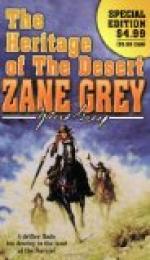It was intolerable for Hare to sit there in the evenings, to try to play with the children who loved him, to talk to August Naab when his eye seemed ever drawn to the quiet couple in the corner, and his ear was unconsciously strained to catch a passing word. That hour was a miserable one for him, yet he could not bring himself to leave the room. He never saw Snap touch her; he never heard Mescal’s voice; he believed that she spoke very little. When the hour was over and Mescal rose to pass to her room, then his doubt, his fear, his misery, were as though they had never been, for as Mescal said good-night she would give him one look, swift as a flash, and in it were womanliness and purity, and something beyond his comprehension. Her Indian serenity and mysticism veiled yet suggested some secret, some power by which she might yet escape the iron band of this Mormon rule. Hare could not fathom it. In that good-night glance was a meaning for him alone, if meaning ever shone in woman’s eyes, and it said: “I will be true to you and to myself!”
Once the idea struck him that as soon as spring returned it would be an easy matter, and probably wise, for him to leave the oasis and go up into Utah, far from the desert-canyon country. But the thought refused to stay before his consciousness a moment. New life had flushed his veins here. He loved the dreamy, sleepy oasis with its mellow sunshine always at rest on the glistening walls; he loved the cedar-scented plateau where hope had dawned, and the wind-swept sand-strips, where hard out-of-door life and work had renewed his wasting youth; he loved the canyon winding away toward Coconina, opening into wide abyss; and always, more than all, he loved the Painted Desert, with its ever-changing pictures, printed in sweeping dust and bare peaks and purple haze. He loved the beauty of these places, and the wildness in them had an affinity with something strange and untamed in him. He would never leave them. When his blood had cooled, when this tumultuous thrill and swell had worn themselves out, happiness would come again.
Early in the winter Snap Naab had forced his wife to visit his father’s house with him; and she had remained in the room, white-faced, passionately jealous, while he wooed Mescal. Then had come a scene. Hare had not been present, but he knew its results. Snap had been furious, his father grave, Mescal tearful and ashamed. The wife found many ways to interrupt her husband’s lovemaking. She sent the children for him; she was taken suddenly ill; she discovered that the corral gate was open and his cream-colored pinto, dearest to his heart, was running loose; she even set her cottage on fire.
One Sunday evening just before twilight Hare was sitting on the porch with August Naab and Dave, when their talk was interrupted by Snap’s loud calling for his wife. At first the sounds came from inside his cabin. Then he put his head out of a window and yelled. Plainly he was both impatient and angry. It was nearly time for him to make his Sunday call upon Mescal.




